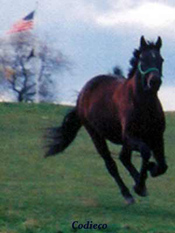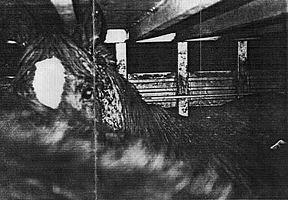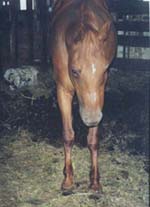
Legislation Information
Pending Legislation
PA's Electronic Bill Room
Type in the word "equine" in the search box to locate bills, (proposed legislation) relating to horses.
Federal Laws
Proposed regs will legalize every inhumane practice identified in the transport of horses to slaughter!

Doubles will be legal for 5 years AFTER the proposed regs go into effect. It has already been 4 1/2 years, that makes for 10 years of the continued use of doubles after this legislation passed..
EPN's Comments
on Proposed Regulations For the 1996 Commercial Transportation of Horses To Slaughter Act
CA Equine Council's
Comments on the Proposed Regulations For the 1996 Commercial Transportation of Horses To Slaughter Act
State Laws
Proposition 6,
The PROHIBITION of Horse Slaughter and Sale of Horsemeat for Human Consumption Act Of 1998, Does Not Violate The Commerce Clause
Horsemeat Laws
1996 Commercial Transportation Of Horses To Slaughter Act
December 7, 2001
Final Rule Commercial Transportation of Horses to Slaughter Act
American Horse Council, American Horse Protection Association, & Humane Society of US
propose to legalize every inhumane practice identified in the transport of horses to slaughter & put the very people identified as the abusers, the "killer buyers" in charge of the horses!
Proposed Regulations For the 1996 Commercial Transportation of Horses To Slaughter Act
USDA Animal & Plant Health Inspection Service, APHIS
Approval of Livestock Facilities;
Interstate Movement of EIA Reactors
USDA Food Safety Inspection Service, FSIS, Regulations
Biological Residues in Horses;
Slaughter of Foaling Mares;
Slaughter of Sick Horses;
USDA APHIS Humane Slaughter Act

AZ Transport Law
CA Transport Law
CT Transport Law
MA Transport Law
MN Transport Law
NY Transport Law
Ag and Markets, Section 359-a

Horses inside double deck cattle trailer stopped by the NYSP. The owner was later convicted & fined $3000.00.
VA Transport Law
Vermont Transport Law
PA Anti Cruelty Law
Title 18, Section 5511
Sign Posted at PA Horse Auctions is NOT the Law!
Sign outside auctions is incorrect!

Sign posted outside 2 PA horse auctions regarding the PA Anti Cruelty Statute is incorrect! " Maybe the posting of this sign has something to do with "the agreement" that the auctions and the PA SPCA have with each other...
U.S. Anti-Cruelty Statutes
PA Domestic Animal Act
Licensing of Dealers & Haulers
EIA Regulations, Coggins Test
PA Dead Animal Act
Requirements for Removal of Dead Animals
PA Animal Markets
General Provisions
Records
Transactions From Trucks
IL Horsemeat Act
Texas Law
Sale of Horsemeat for Human Consumption
Prohibits Sale of Horsemeat For Human Consumption
Texas Attorney General Cornyn States TX Law
Prohibiting Sale of Horsemeat Applies to the 2 Texas Horse Slaughterhouses!
Links
California Voters "Just Say Neigh" to Horse Slaughter!
HoofPAC
Shop online at IGive.com with over 400 great stores you know & love- including Back In the Saddle! Up to 26% of the purchase price is donated to the EPN!
The EPN gets $5 extra the first time you shop!
PayPal accepts credit cards! Please send your tax deductible donation to the:Equine Protection Network, Inc.,
P. O. Box 232, Friedensburg, PA, 17933.
Shop for CD's at CDRush.com & the EPN Benefits!
Put "EPN" in the Coupon Code box when you place your order.
Now you can save money on your favorite music and help the horses at the same time!
HoofPAC is the political action committee that has been formed to end the slaughter of America's horses. Cathleen Doyle, founder of HoofPAC, led the successful Save The Horses campaign in 1998 that made the slaughter of California's horses a felony.

PROPOSITION 6, THE PROHIBITION OF HORSE SLAUGHTER AND SALE OF HORSEMEAT FOR HUMAN CONSUMPTION ACT OF 1998, DOES NOT VIOLATE THE COMMERCE CLAUSE
Lowell Finley, Esq.
A. ab Core Legal Principles.
The Commerce Clause of the United States Constitution, article I, section 8, paragraph 3, gives Congress the power "To regulate Commerce with foreign Nations; and among the several States, and with the Indian Tribes." The Supreme Court has interpreted the Commerce Clause as having two aspects. First, the clause expressly confers power on the Congress to legislate concerning commerce. Second, the clause impliedly prevents states and local governments from enacting laws that interfere with interstate commerce. This second aspect has come to be known as the "dormant" Commerce Clause.
[The] "negative" aspect of the Commerce Clause prohibits economic protectionism - that is, regulatory measures designed to benefit in-state economic interests by burdening out-of-state competitors. Thus, state statutes that clearly discriminate against interstate commerce are routinely struck down, unless the discrimination is demonstrably justified by a valid factor unrelated to economic protectionism.
(New Energy Co. of Indiana v. Limbach (1988) 486 U.S. 269, 273-274 [citations omitted].)
The Supreme Court has developed two tests for state laws that adversely affect interstate commerce. Which test applies depends upon whether the law "discriminates" against interstate commerce, that is, whether the law is intended to have a greater adverse effect upon interstate commerce (and competitors) than upon commerce within the state:
[O]ur case law yields two lines of analysis: first, whether the ordinance discriminates against interstate commerce, Philadelphia, 437 U.S., at 624; and second, whether the ordinance imposes a burden on interstate commerce that is "clearly excessive in relation to the putative benefits," Pike v. Bruce Church, Inc., 397 U.S. 137, 142 (1970). [When] we find that [a state law] discriminates against interstate commerce, we need not resort to the Pike test.
(C & A Carbone, Inc. v. Clarkstown (1994), __ U.S. __, 128 L. Ed. 2d 399.) If a state law is found to discriminate against interstate commerce, it will be declared invalid unless the state "can demonstrate, under rigorous scrutiny, that it has no other means to advance a legitimate local interest." (Id., [citation omitted].)
As noted in Carbone, a more deferential test applies to a state law that does not discriminate against interstate commerce and, although it affects interstate commerce, does so in ways that are incidental to the accomplishment of a legitimate, non-protectionist local purpose:
Where the statute regulates evenhandedly to effectuate a legitimate local public interest, and its effects on interstate commerce are only incidental, it will be upheld unless the burden imposed on such commerce is clearly excessive in relation to putative local benefits.
(Pike v. Bruce Church, Inc. (1970) 397 U.S. 137, 142.)
Courts considering Commerce Clause challenges are more tolerant of state laws that are not designed to achieve economic benefits but rather to advance social welfare, safety, or other non-economic goals:
When there is a reasonable basis for legislation to protect the social, as distinguished from the economic, welfare of a community, it is not for the Court because of the Commerce Clause to deny the exercise locally of the sovereign power of the [state].
(Breard v. Alexandria (1951) 341 U.S. 622, 640.) This deference to non-economic regulation by states is based on the Supreme Court's view of the proper balance between state and federal authority under the Constitution:
In determining whether the state has imposed an undue burden on interstate commerce, it must be borne in mind that the Constitution when "conferring upon Congress the regulation of commerce, . . . never intended to cut the States off from legislating on all subjects related to health, life, and safety of their citizens, though the legislation may affect commerce and person engaged in it without constituting a regulation of it, within the meaning of the Constitution." [Citations.]
(Huron Cement Co. v. Detroit (1960) 362 U.S. 440, 443-44.)
B. ab Application to Proposition 6.
We now turn to an application of these general principles to Proposition 6, the "Prohibition of Horse Slaughter and Sale of Horsemeat for Human Consumption Act of 1998." The first test is whether the initiative discriminates against interstate commerce. Plainly, it does not. Its purpose is non-economic and non-protectionist. It prohibits not only importation or exportation of horses across state lines for slaughter for human consumption, but also makes it unlawful for any person "to sell, buy, give away, hold, or accept any horse" for that purpose. Thus, the law applies with equal force to Californians and non-Californians. The restrictions do not stop at the border, but prohibits any and all activity by anyone within the state that is a step in the process leading to slaughter of a horse for human consumption.
The next inquiry required by the Supreme Court's decision concerns the initiative's purpose. The initiative states that a purpose and intent of the Act is
To recognize the horse as an important part of California's heritage that deserves protection from those who would slaughter them for food for human consumption.
(§ 3, subd. (c).) The Act also finds and declares that
The horse is part of California's heritage, having played a major role in California's historical growth and development. Horses contribute significantly to the enjoyment of generations of recreation enthusiasts in California.
(§ 2, subd. (a).)
The Act's purpose of protecting an animal that is "an important part of California's heritage" is likely to be regarded by courts as a legitimate state purpose. It is comparable to the declared purpose of Congress in enacting the "Wild Free-roaming Horses and Burros Act," 85 Stat. 649, 16 U.S.C. §§ 1331-1340 (1970 ed., Supp. IV.) Congress deemed these animals "living symbols of the historic and pioneer spirt of the West." (16 U.S.C. § 1331.) The Senate committee found:
[These animals] have been cruelly captured and slain and their carcasses used in the production of pet food and fertilizer. They have been used for target practice and harassed for "sport" and profit. In spite of public outrage, this bloody traffic continues unabated, and it is the firm belief of the committee that this senseless slaughter must be brought to an end.
(S. Rep. No. 92-242, pp. 1-2 (1971), quoted in Kleppe v. New Mexico (1976) 426 U.S. 529, 536.)
The final test is whether this non-discriminatory regulation, supported by a legitimate local purpose, nonetheless burdens interstate commerce in a manner which is "clearly excessive in relation to the putative local benefits." (Pike v. Bruce Church, Inc., 397 U.S. at 142.) No alternative means that would have a lesser impact on interstate commerce is available to accomplish the initiative's purpose of stopping slaughter of horses for human consumption. Interstate commerce in horses for slaughter for human consumption across the California border has historically been exclusively a matter of export of California horses to slaughter facilities outside the state. This traffic dwindled significantly in the 1990s, before the 1998 passage of Prop. 6, to a point where only a small number of dealers, truckers, and processing plants are affected. Nationally, California horses constituted a small fraction, well under 10%, of horses slaughtered for human consumption in the United States prior to the passage of Prop. 6. And, judging by the overwhelming level of popular support for Proposition 6, the "local benefits" are substantial: Proposition 6 passed by a statewide margin of 60%, with 4,670,524 "Yes" votes.
In sum, it does not appear that Proposition 6 is vulnerable to
challenge under the Commerce Clause of the United States Constitution.
The law does not discriminate against interstate commerce, it has a valid
and legitimate local purpose, and the burden it imposes on interstate commerce
does not appear excessive in light of its local benefits.
C. ab The Commerce Clause Analyses of Proposition 6 in a Legislative Counsel Opinion and a Law Student Publication Are Fatally Flawed.
Critics and opponents of California's Proposition 6 frequently cite an opinion of the California Legislative Counsel as support for their claim that Proposition 6 violates the commerce clause of the United States Constitution and is therefore invalid and unenforceable. The opinion was issued at the request of State Senator Ken Maddy (R-Fresno) on July 10, 1998, prior to the vote on Proposition 6. The opinion concludes that the provision in Prop. 6 prohibiting slaughter of California horses for human consumption, which is codified as Penal Code section 598c, subdivision (a), imposes an excessive burden on interstate commerce and is therefore unconstitutional.
Before turning to a detailed analysis of the Legislative Counsel opinion on Prop. 6, it is useful to consider the place of Legislative Counsel opinions generally in the hierarchy of authoritative readings of California laws. The Legislative Counsel, a non-judicial position established by statute in 1913, is appointed by concurrent resolution of the State Senate and Assembly. (Gov. Code § 10201.) According to the Legislative Counsel's official website, the role of the Legislative Counsel and his or her deputies is to
assist the Legislature, the Governor, and other state officers by providing legal services relating to the legislative process. We draft legislation, render legal opinions, provide counsel to the Members and committees of the Legislature, and represent the Legislature in litigation. In addition, we publish the Legislative Index, which identifies legislative measures, and compiles and indexes the California statutes and codes. The Legislative Counsel also is responsible for the Legislative Data Center, which operates the legislative information systems and processes legislative measures.
Legal opinions rendered by the Legislative Counsel's office have no precedential value and are not binding on the courts. California courts are free to disagree with the reasoning and conclusions of Legislative Counsel opinions, and they frequently do. In a recent opinion, the California Supreme Court explained:
While an opinion of the Legislative Counsel is entitled to respect, its weight depends on the reasons given in its support. [If] these reasons are unpersuasive, . . . the opinion . . . is of little weight.
(Santa Clara County Local Transportation Authority v. Guardino (1995) 11 Cal.4th 220; accord Ultramar Inc. v. South Coast Air Quality Management Dist. (1999) 17 Cal.App.4th 689, 712 [Court of Appeal "not persuaded" by Legislative Counsel opinion that discussed various statutes without analyzing the statute found to be dispositive by the court].)
In light of these principles, the question becomes: how likely is a court to be influenced by the Legislative Counsel opinion on Prop. 6? Stated differently, how persuasive are the reasons given in support of the opinion's conclusions? The answer is that a court is very unlikely to be influenced or persuaded because the opinion's reasoning is fundamentally flawed. The opinion's flawed reasoning is summed up in the following passage:
[A]lthough the protection of horses from slaughter for use as food for human consumption may be a legitimate local public purpose . . . ., for the reason that this reason is not within the scope of those areas in which state regulation traditionally has been permitted and that subdivision (a) would constitute an absolute ban on importation and exportation of an article of commerce, it is our view that the burden on interstate commerce would be deemed to be clearly excessive in relation to the interest to be served by subdivision (a). Hence, we conclude that subdivision (a) would unconstitutionally affect interstate commerce.
(Leg. Counsel opn., p. 7.)
As the quoted passage shows, the Legislative Counsel's conclusion is based on two factual premises concerning Proposition 6. If those facts are not true, the conclusion lacks any foundation. First, the opinion assumes that the sole purpose of the prohibition on slaughter for human consumption in Proposition 6 is to protect horses. (See also Leg. Counsel Opn., pp. 4, 6.) Second, the opinion assumes that Proposition 6 would impose an absolute ban on the importation and exportation of an article of commerce, i.e., horses. (Id., p. 7.) Both factual premises are demonstrably false.
Proposition 6 does declare as one of its purposes the "protection" of California horses "from those who would slaughter them for human consumption." But the Legislative Counsel opinion ignores other language in the measure that expressly seeks to combat fraud. The Findings and Declarations section of Prop. 6 includes the following:
(d) Horses can be stolen, or purchased without disclosure or under false pretenses, to be slaughtered or shipped for slaughter. These practices have contributed to crime and consumer fraud.
(Prop. 6, § 2, subd. (d), emphasis added.)
The failure to acknowledge the measure's specific reference to fraud is surprising because, as noted on page 5 of the opinion, "the United States Supreme Court has recognized the propriety of local regulations that are designed to promote health and safety, prevent fraud or deception, or ensure the purity of the article of commerce [citations omitted]." (Leg. Counsel opn., p. 5, emphasis added; see California v. Thompson (1941) 313 U.S. 109.) Only by overlooking the express anti-fraud aim of Proposition 6 is it possible for the opinion to assert, incorrectly, that the measure lacks a purpose the Supreme Court's commerce clause jurisprudence has recognized as legitimate.
Second, contrary to the opinion's bald assertion, Proposition 6 does not impose an absolute ban on the importation or exportation of an article of commerce. Subdivision (a) leaves untouched the importation or exportation of horses for sporting, recreational, companionship, or other purposes. Indeed, it does not even restrict importation or exportation of horses for slaughter, so long as the intended use is not consumption by humans as food; it would not, for example, prohibit importation or exportation of horses to be slaughtered for use in pet food. It is thus clear that the measure's narrowly tailored, specific restriction on importation and exportation of horses applies to just one of many possible purposes and does not restrict the shipment of many horses across the state's borders for other purposes. Thus, the opinion's description of subdivision (a) as "an absolute ban on importation or exportation of an article of commerce" is simply wrong.
These basic errors strip the Legislative Counsel opinion of any persuasive force. Nor are these the only significant flaws in the opinion. Elsewhere, the opinion relegates to a footnote a line of U.S. Supreme Court and U.S. Court of Appeals decisions that have equated the States' interest in protection of animals with their interest in protecting the health and safety of their citizens, treating both as legitimate reasons for local laws that burden intestate commerce. (Leg. Counsel opn., p. 7, fn. 2; see Hughes v. Oklahoma (1979) 441 U.S. 322, 337; see also Maine v. Taylor (1986) 477 U.S. 131; New York State Trawlers Ass'n v. Jorling (2d Cir. 1994) 16 F.3d 1303, 1308.) The opinion distinguishes these cases as concerning only to the protection of wild animals, in contrast to Prop. 6, the aim of which it inaccurately describes as "the regulation of horses raised for slaughter for food." In fact, unlike cattle, few if any horses are "raised for slaughter for food." Subdivision (b) of section 2 of the initiative, which the opinion footnote cites in support of its characterization of the measure's purpose, in fact states just the opposite. In that provision, the people of the State of California find and declare that "Horses are not raised for food or fiber and are taxed differently than food animals." (Emphasis added.) The measure's prohibition on importation into California for slaughter for human consumption would apply to importation of wild horses, which are common in several western states. Thus, even if the Legislative Counsel were correct in concluding that the Supreme Court cares only about the protection of wild animals and not horses raised as companions, Proposition 6 could be defended on that ground as well.
In sum, the Legislative Counsel opinion is unlikely to persuade any court that Proposition 6 violates the commerce clause of the United States Constitution. The opinion is based upon false factual premises and faulty reasoning that cannot withstand careful scrutiny.
Critics and opponents of Proposition 6 have also taken comfort from a 1998 article published by the Governmental Affairs Student Association of the McGeorge School of Law. "Materials on Proposition 6: Prohibition on Slaughter of Horses and Sale of Horsemeat for Human Consumption" was written by Greg Fayard, at the time a second-year law student at McGeorge. Fayard concludes that "subdivision (a) may unconstitutionally affect interstate commerce and thus violate the Commerce Clause of the United States Constitution." In reaching this conclusion, however, Fayard relies heavily on the Legislative Counsel opinion authored by Deputy Legislative Counsel Jana Harrington, discussed above, which he cites more than half a dozen times. Not surprisingly, Fayard's Commerce Clause analysis suffers from the same, fatal defects. Like Harrington, Fayard concludes that the initiative's purpose "is not within the scope of those areas in which state regulation traditionally has been permitted," ignoring the express anti-fraud purpose of Prop. 6. And like Harrington, Fayard falsely portrays subdivision (a) as "an absolute ban on an article of interstate commerce." Thus, Fayard's analysis is no more likely than the Legislative Counsel opinion to persuade a court.
Conclusion
The prohibition on slaughter of horses for human consumption in Proposition 6 stands up well to scrutiny under the Supreme Court's tests for validity under the Commerce Clause of the United States Constitution. Widely-circulated legal analyses by the California Legislative Counsel and a law student reach a contrary conclusion, but these analyses are based on the same, demonstrably false premises.
It can never be said with certainty whether any law is constitutional unless and until the Supreme Court upholds it, or refuses to review a lower court's decision striking it down. At present, no case challenging the constitutionality of Proposition 6 is pending in any court, making consideration of the law by the Supreme Court, if it is ever to occur, a remote possibility. An examination of the Court's past decisions suggests, however, that a constitutional challenge to Proposition 6 under
Save America's Horses! |
|||||||
|
Please send your tax deductible donation to: Equine Protection Network, Inc., P. O. Box 232, Friedensburg, PA, 17933 |
||
Save America's Horses- Make the Commitment to Your Horse! |
||
|
Photos On This Page CANNOT be Used Without Written Permission
|
||


